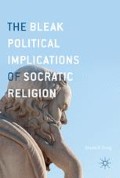Abstract
This chapter catalogues the detrimental effects of Socratic religion analyzed in the book—the morally destructive burden of guilt, the repressive authoritarianism, the eclipse of pluralism, the alliance of religion and morality, the transformation of hubris into piety, and the fanaticism, zealotry, dualism, and nihilism that are unleashed as a result. Far from bequeathing to the West a more “advanced” conception of the divine as scholars from Hegel to Gregory Vlastos have argued, Socratic religion anticipated the conceits of monotheism, the intolerance of Christianity, the cruelty of priestly rule, the appetite for martyrdom, the criminalization of thought, and even the nihilism of postmodernity.
Access this chapter
Tax calculation will be finalised at checkout
Purchases are for personal use only
Notes
- 1.
Gregory Vlastos, “The Paradox of Socrates,” in Vlastos (ed.), The Philosophy of Socrates: A Collection of Critical Essays (Notre Dame, Indiana: University of Notre Dame Press, 1980); John Burnet, “The Socratic Doctrine of the Soul,” Proceedings of the British Academy, Vol. VII (January 26, 1916), p. 13.
- 2.
Plato, Timaeus, 28a, in The Collected Dialogues of Plato, Edith Hamilton and Huntington Cairns (eds.) (Princeton, New Jersey: Princeton University Press, 1961).
- 3.
For my brief account of the problem of evil, see “The problem of Evil, Part I” and “The problem of Evil, Part II” in Free Inquiry (October/November 2011), pp. 13, 50–55, and (December 2011/January 2012), pp. 14, 54–55.
- 4.
Hegel, Philosophy of History (1822), transl. by J. Sibree (New York: Prometheus Books, 1991), “Modern Age” p. 425.
- 5.
Benedict XVI, Spe Salvi (On Christian Hope, 2007).
- 6.
See Terror and Civilization (New York: St. Martin’s Press, 2004), Part III, “Inner State of Siege,” Part IV, “Promethean Revolt” and “Romanticizing Evil.”
- 7.
Phaedrus, 238c, 244a–c.
- 8.
Symposium, 215b.
- 9.
Apology, 23b.
- 10.
Ibid, 40a.
- 11.
On the Catholic Inquisition see my Aquinas and Modernity: The Lost Promise of Natural Law (New York: Rowman & Littlefield Publishers Inc., 2008).
- 12.
See for example, Plato, Laws, 841 d (prohibition of extra-marital sex and sodomy), 836 c–d (prohibition of homosexuality), and 942 c–d (the “emancipation” of women as the representatives of private life).
- 13.
Apology, 30a.
- 14.
Hannah Arendt has rightly criticized Plato for turning politics into what she calls “making” as opposed to “acting.” The former is appropriate for the crafts, whereas the latter is appropriate for politics. Turning politics into a craft is disregarding the reality and plurality of other human beings with goals and ends of their own. See Hannah Arendt, The Human Condition (Chicago: University of Chicago Press, 1958).
- 15.
In our time, some of the staunchest defenders of Western superiority, dominance, and conquest are stalwart secularists such as Christopher Hitchens, Sam Harris, and Paul Berman.
- 16.
To be fair, not all Enlightenment philosophers were colonialists at heart—then or now. Johann Gottfried Herder was a pluralist and Denis Diderot thought that exporting the hypocrisy and corruption of his society made no sense. See Sanka Muthu, Enlightenment Against Empire (Princeton: Princeton University Press, 2003).
- 17.
Mathew Arnold, “Hellenism and Hebraism,” in Culture and Anarchy (New York: Oxford University Press, 1932, 2007).
- 18.
Paul Veyne, Did the Greeks Believe in their Myths? An essay on the constitutive imagination, transl. by Paula Wissing (Chicago: University of Chicago Press: 1988), p. 90.
- 19.
Ibid, pp. 117, 122.
- 20.
Ibid, p. 128.
- 21.
Ibid, p. 126.
- 22.
Ibid, p. 126.
- 23.
Ibid, p. 85.
- 24.
Ibid, pp. 85, 84.
- 25.
Plato, Republic, 351d and 352 c.
- 26.
Veyne, Did the Greeks Believe in their Myths? p. 114.
- 27.
See Alexandre Kojève: The Roots of Postmodern Politics (New York: St. Martin’s Press, 1994).
- 28.
Paul Rabinow (ed.), The Foucault Reader (New York: Pantheon Books, 1984), p. 343.
- 29.
Jean-Paul Sartre, Critique of Dialectical Reason, translated by Quintin Hoare (New York: Verso, 1991).
- 30.
Terry Eagleton in Reason, Faith & Revolution: Reflections on the God Debate (New Haven: Yale University Press, 2009). See my critique of Eagleton in “Re-Inventing Christianity,” Free Inquiry, (August/September, 2010) pp. 12 & 44.
Author information
Authors and Affiliations
Rights and permissions
Copyright information
© 2017 The Author(s)
About this chapter
Cite this chapter
Drury, S.B. (2017). Socratic Mischief. In: The Bleak Political Implications of Socratic Religion. Palgrave Macmillan, Cham. https://doi.org/10.1007/978-3-319-54442-7_7
Download citation
DOI: https://doi.org/10.1007/978-3-319-54442-7_7
Published:
Publisher Name: Palgrave Macmillan, Cham
Print ISBN: 978-3-319-54441-0
Online ISBN: 978-3-319-54442-7
eBook Packages: Political Science and International StudiesPolitical Science and International Studies (R0)

